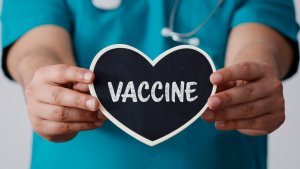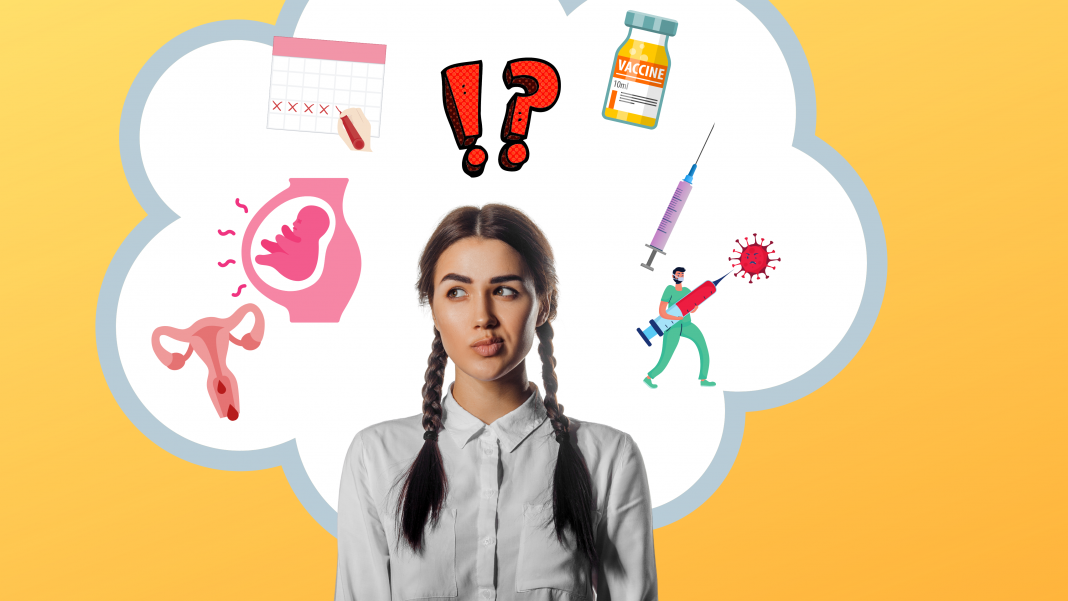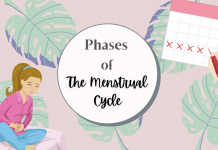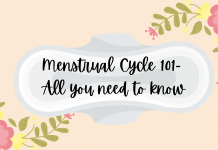Here, in this article, we will talk all about Coronavirus and Menstruation- COVID-19, Vaccination, and Periods.
With vaccination being the need of the hour, and doses of vaccines being administered in multiple countries, there arises one question- How does vaccination affect our period?
Along with several other myths about vaccination coming to light, there is this one myth that has been the most circulated one on social media- “Women should not get vaccinated five days before or after their periods as their ‘immunity is compromised’ during periods.”
A number of health professionals replied by busting this myth about vaccination and periods for their followers on social media platforms but it seems a large number of people still believe it to be true.
However, this doesn’t really seem to be the only myth to hit the misinformation market. In this article, we will be breaking down some misconceptions about how COVID-19 affects your period.

The Relation Between COVID-19 and Periods
Most people have had questions about how COVID-19 has affected periods or if there is a relation between the two at all.
While some people have experienced changes like heavier/lighter flow, or irregularities, some claim to experience no changes at all.
While all this evidence can be circumstantial at its best, since we all have experienced a sudden change in our lifestyle, the theory might even hold some truth to it.
Adding to that, since almost any sickness can cause menstrual irregularities, it is quite unclear if this specific illness has something to do with menstruation.
Since there isn’t enough data as the effects on the menstrual cycle haven’t been studied as much, all these irregularities could also be caused by the stress and changes in lifestyle as well.
Now, the question here is –
Does menstruation affect vaccine efficacy?
According to Dr Astha Dayal, Department of Obstetrics & Gynaecology, the CK Birla Hospital, Gurgaon, these vaccines are very much safe, with or without a period.
“COVID vaccine can safely be taken during periods. There is no data or study validating this claim. The vaccine is life-saving and should be taken as early as possible.”
Menstruation is a natural process of the body and it does not lower the body’s immune response.
Since there are hormonal changes occurring in the menstrual cycle, they may have a little impact on how your body reacts to illness and side effects.
It’s also important to understand that menstruation is a natural body process and doesn’t really limit or decrease the body’s immune response. Menstruation involves hormonal changes which may minimally impact how you react to an illness or react to side effects, but in no way does it actually decrease immunity.
Vaccines just contain a weakened or inactive strain of the pathogen which is injected into the body in order to trigger an immune response. This is in no way related to menstruation. The menstrual cycle is just the lining of the uterus shedding as a result of not getting pregnant.
MYTH- Vaccines can make you infertile
Another myth going around about vaccination that the vaccine can alter/harm a protein in the placenta that may cause infertility as the placenta is the tissue that provides nutrition to the developing fetus.
This claim, however, is a myth. Anti-vaxxers are adamant about this and refuse to take the jab. There is no such evidence that the vaccine can cause infertility.
The vaccine builds immunity against the SARS-Cov-2 virus so our body can fight the infection and lower the chances of getting hospitalized.
Do vaccines cause changes in periods?
Vaccines do have side effects but it depends on people to people. All bodies function differently and react to different stimuli differently.
While some people may suffer from a heavier or lighter period, some may experience no changes at all.
In a lot of countries, all adults including pregnant women have been vaccinated.
In India however, the vaccine has not been made available to pregnant people yet. Currently, all citizens above 18 years of age are required to get vaccinated.
In case you have been vaccinated and realized you are pregnant later on, there is no need to worry. However, you should inform your healthcare provider about the same.

Pregnancy and vaccination
Some countries like the US have allowed those who are pregnant to get vaccinated. In India however, the vaccine has not been made available to pregnant people since there is not enough data on how the vaccine will affect them.
The vaccine is administered in the USA is mRNA type which is different from the one being used in India.
However, there isn’t enough evidence about the vaccine being harmful to pregnant women.
Currently, lactating mothers can get themselves vaccinated. In fact, mothers can get jabbed anytime after delivering the child.
Birth control
If you are on hormonal birth control and are thinking about getting jabbed, you might want to keep in mind that the risk of getting blood clots after vaccination is 1 in 1000. If you are on such pills, it is advisable to talk to your healthcare provider.
Risk Factors
There are other things that can increase your risk like obesity, smoking regularly, diabetes, and heart problems.
Also, If you have PCOS, make sure you inform your healthcare provider of your condition. This will help them be wary of the risk of side effects if any.
The Bottom line
The risk of developing blood clots from getting COVID-19 is much higher than getting blood clots from the vaccine. Therefore, if you happen to be in the high-risk group, it is advisable to take the vaccine as soon as possible under the guidance of your healthcare provider.
To keep up to date with us, follow us on facebook.




